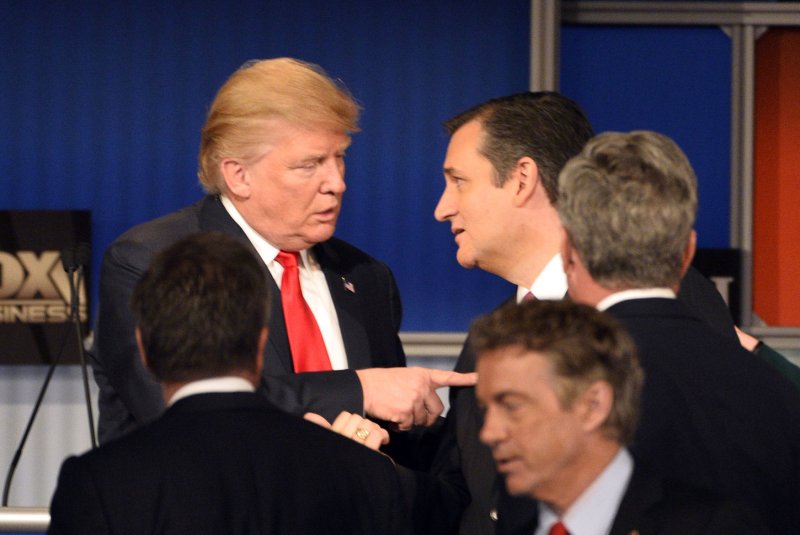Republican presidential hopefuls Donald Trump (L) and Sen. Ted Cruz (R-TX) talk after the fourth Republican debate at the Milwaukee Theater in Milwaukee, Wisconsin on November 10, 2015. Questions remain about Cruz's constitutional eligibility to run for president. Photo by Brian Kersey/UPI |
License Photo
At this moment, and it may quickly fade, four candidates are the leading contenders to win the Republican presidential nomination next year: Donald Trump, Ben Carson, Marco Rubio and Ted Cruz.
In terms of experience, none brings extraordinary or even entry-level qualifications to serve as the nation's chief executive. Two have no government experience, which to some Americans is important, and no one would choose a surgeon with such an empty resume. And two have not served enough time in the U.S. Senate to warrant an experienced stamp of approval.
On temperament, readers can make up their minds. But, in terms of the only absolute requirements for president specified in the U.S. Constitution, clearly one candidate fails muster. The Constitution requires only four qualifications for president. That person must be at least thirty-five years old, reside for at least fourteen years in the country, receive a majority of Electoral College votes, and be a "natural born citizen."
"Natural born" has been interpreted as having been born in one of the United States. No case law, or the Founding Fathers, explicitly defined the explicit meaning of "natural born." And there have been certain anomalies. Charles Curtis, Herbert Hoover's Vice President, was born in Kansas in 1860 a year before it became a state. Barry Goldwater was born in Arizona in 1909, three years before it was granted statehood. Neither was challenged. A more relevant case was John McCain's presidential candidacy in 2008.
McCain was born at Coco Solo Naval Base in the Panama Canal Zone in 1936 to American parents and a father who was a naval officer stationed there in command of a submarine. In 1937, Congress enacted 8 USC1403 that granted full citizenship to children born of parents in the U.S. military serving in the Canal Zone. In 2008, one Fred Hollander challenged McCain's qualification in court and lost. In addition, before the 2008 election, the U.S. Senate unanimously passed a resolution declaring McCain a natural born citizen.
Ted Cruz was born in Calgary, Canada of an American mother and a non-American Cuban father. No matter how the meaning of "natural born" may be twisted and distorted, it is impossible to see how Cruz qualifies constitutionally. Ironically, the Republican "birthers," particularly Donald Trump, accused Barack Obama of being born in Kenya and hence not eligible to become president, but they have maintained remarkable silence over Mr. Cruz's birthplace.
Many will argue that this constitutional mandate is well past its sell-by date. But so are other constitutional strictures. The Seventh Amendment, for example, states that any legal case involving more than $20 can be heard by a jury. And, of course, the first words of the Second Amendment, "A well regulated militia....," have been ignored by courts in granting citizens virtually unlimited rights to bear and carry arms.
Surprisingly, the issue of Cruz's birth has not been discussed beyond low-level warning shots.
Republicans clearly are waiting to see who actually emerges as the nominee and Cruz is still a long shot. Democrats are lying in wait not wising to expend valuable political ammunition in advance. With the furor over Bush v. Gore case that awarded the presidency to the loser of the popular vote, one can imagine what will happen if Cruz wins the nomination and then is taken to court over his eligibility. Conceivably, the bottom of the ticket -- the vice presidential candidate -- might be elevated to the top slot. Bizarre, yes, but so has American politics evolved in strange ways.
The larger issue rests on the judgment, character and experience of the candidates of both parties. To certain Republicans, especially of the center -- maybe a group on the verge of extinction -- none of the four appear electable. Since Democrats have an advance edge in electoral votes, nominally being assured of at least 240 of the necessary 270, and with Republicans seemingly quite happy to neglect women and minorities, winning the White House in 2016 seems a bridge too far for the GOP.
Despite the polling that still puts Trump and Carson in the lead, the campaign is highly volatile and almost certain to change dramatically. Hillary Clinton is still not clear of the e-mail controversy that potentially could wreck her candidacy. Still, the question of Cruz's eligibility to be president is something that should be decided sooner than later. And Cruz would be wise not to count on the Senate voting to declare him natural born as it did for McCain.
_______________________________________________________________________
Harlan Ullman is Chairman of the Killowen Group that advises leaders of government and business and Senior Advisor at Washington DC's Atlantic Council and Business Executives for National Security (BENS). His latest book is A Handful of Bullets: How the Murder of Archduke Franz Ferdinand Still Menaces the Peace.















